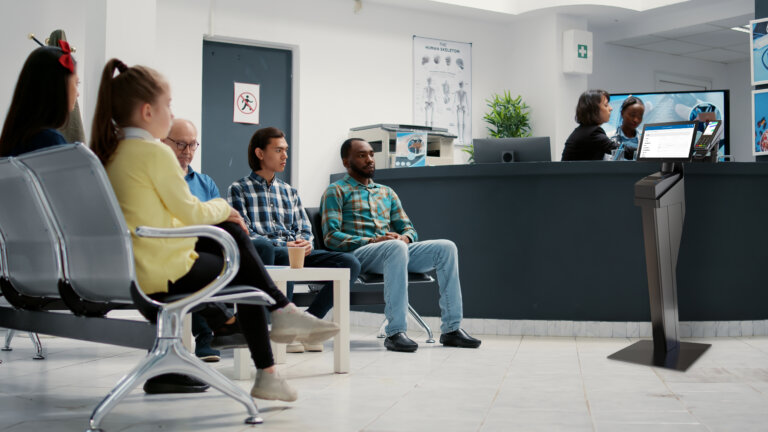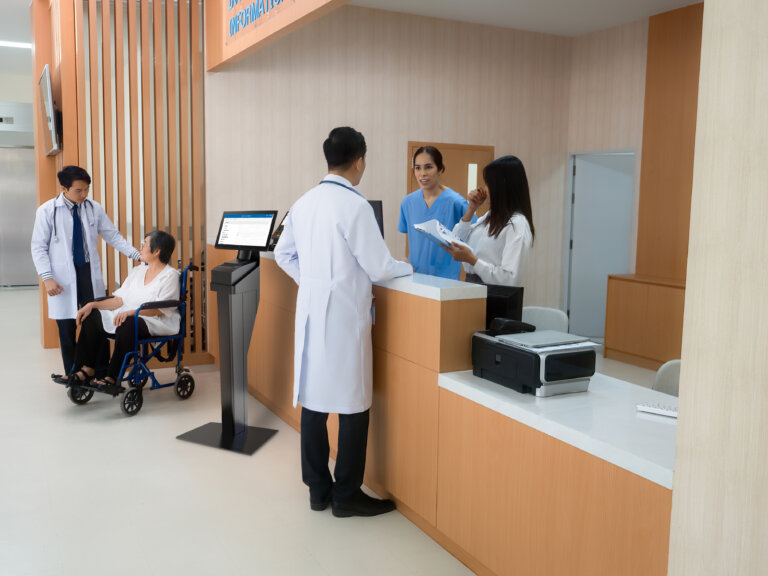WARMINSTER, PA, JANUARY 30, 2024 –
Technology in Healthcare
By definition, healthcare technology is any technology designed to support healthcare organizations and their operations. This can include medical equipment, IT systems, patient-facing devices, and other hardware and software forms. Technology is expected to continue transforming healthcare in major and minor, medical and non-medical ways.
The Rise of Self-Service
For any consumer-facing industry, whether retail, hospitality, or healthcare, self-service technology is not the future – it is the present. Self-service typically refers to instances wherein consumers (or, in this case, patients) go through the checkout or check-in process themselves without the aid of an employee. Of course, there may be instances where employees are required to step in to rectify any issues. Still, self-service is typically an excellent way for organizations to reduce the amount of labor power allocated to the checkout/in area.
Self-Service in Healthcare
In healthcare specifically, self-service is a continually rising trend. No matter the medical setting, whether located in a hospital, a specialist doctor’s office, or a pharmacy, self-service kiosks can be of significant merit. Some have even reported that self-service will be essential to providers’ ability to keep up with ‘healthcare consumerism.’ As will be discussed in this blog, using self-service kiosks in healthcare can be an excellent way to reduce pressure on busy medical employees and cater to growing patient demand for autonomy and control over their healthcare experience
The Benefits of Self-Service in Healthcare
Convenience
Nowadays, many patients hope for a convenient, seamless, and flexible healthcare experience. This is especially true when patients deal with significant health-related life events and changes. For instance, a recent report found that 80% of patients would switch healthcare providers for convenience factors alone. As such, self-service can be an excellent opportunity for providers to ensure a convenient and comfortable patient experience. Nowadays, many people view self-service as more convenient and often quicker than dealing with employees. So, by providing patients access to self-check-in and other self-service forms, they can foster the desired feelings of convenience and autonomy. Plus, by providing a quick and seamless experience, providers can help patients reduce anxious emotions surrounding their appointment/treatment.
Cater to Patient Requirements and Preferences
Although healthcare providers may see changing patient preferences as another challenge to overcome, this need not be the case. As mentioned above, many individuals now prefer the convenience and autonomy of self-service. With patient preferences for self-service kiosks rising, providers should see these changing preferences as an opportunity to enhance patient experience and increase overall satisfaction.
The implementation of self-service technology can also be beneficial for accessibility. All patients must have access to healthcare services, regardless of any disabilities, language barriers, or other preferences they may have. For instance, self-service kiosks can be programmed to operate in multiple languages, making the healthcare experience more convenient and pleasant for those who may not speak the local language. In turn, for patients who wish to avoid traditional face-to-face contact with employees for whatever reason (e.g., disability or mental health), self-service kiosks are an ideal solution.
Reduce Contact Between Staff and Patients
One of the significant impacts of using self-service kiosks is that they reduce the amount of contact between healthcare staff and patients. Many would argue that this is highly beneficial, especially in cases where the reception staff is potentially serving patients with contagious illnesses (e.g., COVID-19).
Minimize Human Error
The accuracy of patient data is critical, not only for the safety of patients but also for overall operational efficiency. As mentioned above, self-service technology removes the need for reception staff to check in patients for appointments manually. The responsibility of verifying information is therefore passed from staff to the patients themselves, thereby helping reduce the potential for error. It is also likely that this helps reduce the pressure and anxiety on staff in what is already a high-stress environment.
Enhance Operational Efficiency and Reduce Patient Waiting Times
Self-service healthcare kiosks are an excellent solution for healthcare providers seeking to identify ways to improve efficiency and productivity. Without the need for reception staff to manually check patients in for appointments, they can focus their time and effort on other areas that add value to patients. Without the typical staff-patient interaction, it has been found that self-check-in helps to reduce patient waiting times overall. This is a huge benefit, especially when patients are in poor health and want to minimize the time they spend in waiting rooms. In turn, asking patients to confirm basic demographic details during patient self-check-in is another way to boost operational efficiency as it can save medical employees time later in the appointment process.
Versatile Use Cases
Self-service kiosks offer significant advantages to healthcare providers as their inherent versatility means they can be utilized for several different use cases. Alongside self-service patient check-in, self-service healthcare kiosks can be used for payment processing, digital signage and to provide access to information such as wayfinding maps, FAQs, and more.
Havis Self-Service Kiosk Options
As a leading provider of innovative technology mounting solutions for various industries, Havis designs and manufactures a range of kiosks for healthcare. From sleek, minimalistic podiums to fully accessorized kiosks, Havis can offer the ideal self-service solution for a myriad of healthcare environments and use cases.
Available in pedestal, countertop, and wall-mounted varieties, Havis kiosks can easily be tailored to the user’s exact requirements. In particular, our all-new SC-1000 series boasts a sleek, ergonomic design and a wide range of customization options. Available in both floor-standing and countertop variations, the SC-1000 creates ideal healthcare kiosks for use in a wide variety of different healthcare settings. When designing the ideal SC-1000 kiosk solution, whether for patient check-in, information access, or something else entirely, healthcare providers can easily add a range of peripherals such as a printer, payment device, and more.
Empower patients and increase operational efficiency with self-service kiosks from Havis. Learn more here.
ABOUT HAVIS
Havis, Inc. is a privately held, ISO 9001-certified company that is the leader in providing robust and reliable end-to-end technology mounting and mobility solutions in demanding environments. The Havis legacy dates back over 80 years as a trusted designer and manufacturer of critical equipment that ensures critical technology is accessible, secure and reliable.
Havis’s engineering and manufacturing teams are committed to consistently researching and developing unique products and solutions for a range of industries worldwide. With headquarters in Warminster, PA, and additional locations in Plymouth, MI, Burnsville, MN, and in the UK, Havis currently employs more than 400 team members. For more information on Havis, please call 1.800.524.9900 or visit http://www.havis.com.



